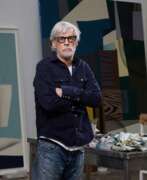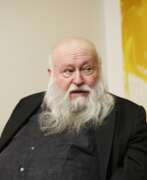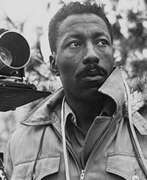Composers 21st century
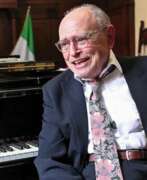

Silvano Bussotti is an Italian composer, painter and opera director, set and costume designer.
Silvano learned to play the violin at an early age, studied harmony and counterpoint at the Cherubini Conservatory in Florence, and studied with various teachers. In addition to music, he was fond of drawing and painting. His first works, influenced by Luigi Dallapiccola and Roberto Lupi, were written in the avant-garde dodecaphonic technique, and he also made extensive use of the aleatoric method. Bussotti was a participant in "anti-music" concerts, for which he created works without any sounds at all.
Bussotti's compositions include numerous pieces for various vocal, instrumental and mixed ensembles. In 1963 he co-founded the Group of 70 (Florence). Between 1968 and 2001 he worked as a director, costume designer and stage designer at the leading opera houses in Italy, La Scala, La Fenice; Massimo (Palermo), Reggio (Turin) and others. In total, he created about 40 opera productions.
Bussotti's art exhibitions are held in various countries around the world. Bussotti is also known for his extravagant graphic scores, in which he found self-expression as an artist, but this hides the meaningful nature of his musical achievements.
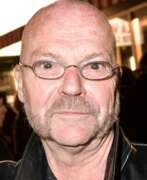

Wolfgang Flatz is a contemporary Austrian artist, stage designer, musician and composer. Currently lives and works in Munich, Germany.
After engaging with contemporary art movements such as Heppening and Viennese Actionism, Flatz creates works using a variety of media - painting, sculpture, performance, video, computer, film, photography, theatre, music, design and architecture. Subjects include voyeurism, the body, violence, aggression, pain, love, politics and audience interaction.
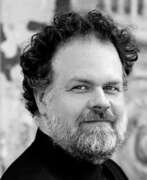

Jens Gerd Joneleit is a German abstractionist and composer who lives and works in Germany and the United States.
He studied art and music at the University of South Dakota and the University of Wisconsin-Madison, then returned to Germany.
His paintings and other visual works have been the subject of numerous gallery exhibitions of contemporary art in the United States and Europe.
As a composer, Jens Jonleit has written numerous compositions for orchestras, ensembles, and chamber groups in Europe and the United States. He is also known as a composer of music and theater works and opera.
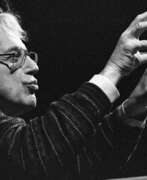

György Ligeti, full name György Sándor Ligeti, was a Hungarian and Austrian composer and musicologist.
Ligeti was born into a Jewish family, but his mother tongue was Hungarian and from an early age he was exposed to Romanian and Hungarian folk music. His first significant work was the Romanian Concerto, which he wrote in 1951. In 1956 Ligeti emigrated from Hungary to Austria, receiving Austrian citizenship in 1968.
In 1957 in Cologne, Ligeti met the experimental composers Karlheinz Stockhausen and Gottfried König and worked with them in the field of academic electronic music, but soon switched to instrumental music. He gained recognition from the Western avant-garde in 1961 with his work Visions and others, in which he used sonorics and the micropolyphony technique he had invented. In 1965 Ligeti completed one of his major works, Requiem.
During his life, Ligeti changed his compositional style and technique several times, ranging from electronic music and sonoricism (1950s and 1960s) to neoromanticism (1980s and 1990s). He has also written many theoretical articles on new currents in music.
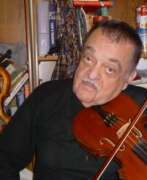

Jovan Mihailović is a Serbian and American musician, artist and writer.
Jovan Mihailović was born and raised in Belgrade, the capital of Serbia, where he and his family survived the Nazi occupation and the transition to communism. From a young age, he demonstrated artistic ability and began to draw, paint and play the violin. He studied at the Belgrade Theater Academy, worked as a playwright in Yugoslavia and traveled throughout Western Europe as a folk musician before immigrating to Sweden, Canada and finally Chicago in 1971.
Jovan was an active member of Chicago's creative community for four decades, writing dozens of novels, plays, and short stories, as well as performing music in restaurants and cafes. He also created many hundreds of drawings and paintings that are full of emotionally intense images from the artist's mystical universe of beauty.
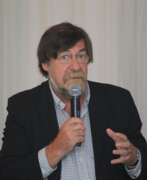

Nigel Osborne is a British composer, educator and humanitarian activist.
He studied composition at Oxford and in Warsaw. In Poland he co-founded one of the first live electronic performance groups in Eastern Europe and worked in the Experimental Studio of Polish Radio, beginning a special relationship with electroacoustic music throughout Europe.
Nigel Osborne works extensively in long-term collaborative projects, for example with the Vienna 20jh Ensemble, the London Symphonietta, the Nash Ensemble, the Scottish Chamber Orchestra and others. Theater productions have always been an important area for him. Among the major works for the theater is an interesting opera "Electrification of the Soviet Union". His series of musical and dance collaborations - "Apollo in Despair", "Wilderness", "Zanza", "Mythologies", and in opera and musical theater - "Hell's Angels", "Faust" and others are known.
Osborne's major orchestral works include Symphony 1 for the BBC Symphony Orchestra and Sun of Venice for the Philharmonic Orchestra. Osborne is a full-time professor at the University of Edinburgh and an advisor to War Child, the charity responsible for the humanitarian aid program in Bosnia and Herzegovina. He is generally known for his extensive charity work supporting children traumatized by war, particularly in the Balkans during the Bosnian War and in the Syrian conflict, using his own music therapy techniques.
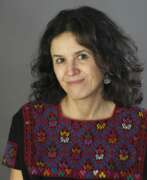

Hilda Paredes is a composer originally from Mexico, mainly living and working in London.
After studying at the Conservatory of Music in Mexico City, Hilda Paredes earned a Master of Arts degree at City University in London and a doctorate at the University of Manchester under the supervision of Professor John Casken. She has been living and working in London for some 40 years, but continues to be involved in the musical life of her native Mexico as a composer and teacher. Hilda has taught composition and lectured at the University of Manchester, the University of California San Diego, and the University of Buffalo.
Although there is evidence of the presence of Mexican art in her works, Hilda Paredes also draws inspiration from many composers and cultures from around the world. Her music has been critically acclaimed for its refinement of craftsmanship, dramatic power, and poetic approach. Hilda incorporates a wide range of electroacoustic elements into her works.
One of Paredes' most internationally acclaimed works is the chamber opera Harriet. It has been performed in Mexico, the UK, France and Belgium. For this work, Hilda was awarded the prestigious Ivors Composer Award 2019 (formerly British Composer Awards).


Augusta Read Thomas is an American composer and professor.
Augusta Thomas studied composition at the Tanglewood Music Center and at Yale University, Northwestern University, and the Royal Academy of Music in London. She was a member of the Chicago Symphony Orchestra for many years. Thomas was also composer-in-residence with the New Haven Symphony Orchestra. Augusta Read Thomas is Professor of College Composition at the University of Chicago, In 2016, she founded that university's Center for Contemporary Composition, which provides a dynamic, collaborative, and interdisciplinary environment for the creation, performance, and study of new music, as well as career development for emerging and established composers and performers.
One of Thomas' best-known works is Astral Song for solo flute, solo violin and orchestra. Her most recent works include the opera Sweet Potato Kicks the Sun (2019), and she has also written numerous orchestral and choral works, concertos, and solo compositions. Augusta Read Thomas is a member of the American Academy of Arts and Sciences and the American Academy of Arts and Letters. She is considered the best-known contemporary American composer.
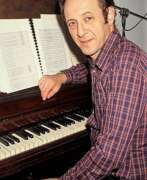

Steve Reich, full name Stephen Michael Reich, is an American minimalist composer.
Reich came from a Jewish family, graduated from Cornell University with a Bachelor of Arts degree in philosophy, and pursued a parallel career in music education. At Mills College in Oakland, California, he earned a master's degree in composition.
In 1966, he founded his own ensemble, Steve Reich and Musicians, where he was free to experiment with the form of composition. One of the pioneers of minimalism, he composes music that is essentially tonal-modal and characterized by repetition, a steady pulse, and a clear structure. His innovations include the use of tape loops to create phased patterns.
Reich himself cites the works of Igor Stravinsky, Johann Sebastian Bach, jazz music, and the music of West Africa as sources of his inspiration.
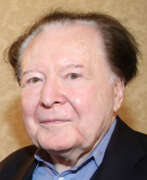

Gerhard Rühm is an Austrian author, composer and visual artist.
His artistic production is inspired by August Stramm, Kurt Schwitters, Gertrude Stein, Carl Einstein und Paul Scheerbart. Rühm's works are often located at the border between music, language, gestures and the visual. His audible works are outstanding examples of innovative radio plays and acoustic art. During a sojourn in Lebanon he became interested in eastern musical styles.
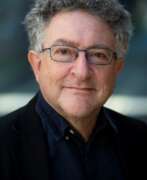

Robert Saxton, full name Robert Louis Alfred Saxton, is a British composer.
Born into a family of Jewish immigrants, Robert began composing music at the age of six and studied at Cambridge and Oxford Universities. Saxton has worked as Professor of Composition at Oxford University and as a Research Fellow in Music at Worcester College. Since 2013 he has been Composer of the Purcell School for Young Musicians Association and has been appointed an Honorary Fellow of the Royal Academy.
Robert Saxton works in a wide variety of genres. His recent works include the opera The Wandering Jew, song cycles, orchestral symphonic compositions and works for strings and piano.
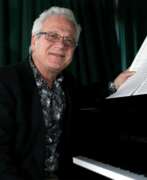

Thomas Simaku is an Albanian and British composer living and working in York.
Simaku graduated from the Albanian State Conservatory of Music in Tirana, before being appointed music director of the Palace of Culture of Permet in southern Albania. In 1991 Simaku moved to England, studied with David Blake at the University of York and earned a doctorate in composition.
Thomas Simaku rose to fame in 1995 when his work Epitaph for String Orchestra was selected by an international jury to participate in the ISCM World Music Days in Germany. It was the first time the music of an Albanian composer was included in this prestigious festival. His works then participated many times in various world music festivals.
In 2000, Simaku was granted British citizenship. He lives in York and teaches composition at the University of York.
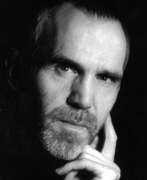

Howard While Skempton is a British composer, pianist and accordionist.
From 1967 Skempton studied in London with Cornelius Cardew, who helped him discover a musical language of great simplicity. Skempton and became known for the particular clarity of his musical language. He wrote over 300 works, many of which are miniatures for solo piano or accordion.
Skempton calls his works the "central nervous system" of his oeuvre. They include pieces for solo cello and guitar, Chamber Concerto for fifteen instruments, Concerto for Hardy Gurdy and Percussion, and others. Skempton's first major success came in 1991 with the premiere of his orchestral composition Lento. His orchestral and instrumental works have been recorded by the BBC Symphony Orchestra and the Bash Ensemble, among others.
In recent years Skempton has increasingly concentrated on vocal and choral music; his choral commissions include works for the BBC Singers and the Belfast Philharmonic Society. He is Professor Emeritus of Music at De Montfort University.
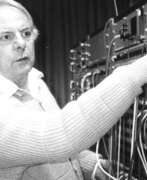

Karlheinz Stockhausen was a German innovative and avant-garde composer, conductor, and musical theorist.
Stockhausen studied at the State Academy of Music in Cologne and the University of Cologne, then in 1952 in Paris with composers Olivier Messiaen and Darius Millau. Returning to Cologne in 1953, he joined the electronic music studio West German Broadcasting (Westdeutscher Rundfunk), of which he was artistic director from 1963 to 1977. Stockhausen created his first electronic music piece in 1953.
In the mid-1950s Stockhausen studied phonetics, acoustics and information theory at the University of Bonn, all of which he used in his musical compositions. From 1953 he began teaching composition in Darmstadt and later organized seminars in Cologne. From 1971 to 1977 he was already professor of composition at the State Academy of Music in Cologne.
Stockhausen used both electronic and traditional instrumentation and supported his approach with rigorous theoretical reasoning and radical innovations in musical notation. He ensured that sounds were equally interesting regardless of the order in which they appeared; random decisions of musical order play an important role in many of his compositions.
Stockhausen lectured and gave concerts with his works throughout Europe and North America. As a creator and theorist of electronic and serial music, he had a significant influence on avant-garde composers of the 1950s and 1980s.
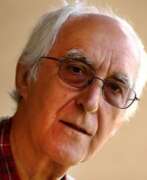

Giles Swayne, full name Giles Oliver Cairnes Swayne, is a British composer.
Swayne began composing music at an early age, receiving his musical training at Ampleforth College and the University of Cambridge, and then at the Royal Academy of Music. He wrote a series of relatively small pieces, mostly aimed at children or amateurs, which explored ways of conveying complex musical thought as simply as possible.
Swayne's stylistic approach to virtuosic simplicity is noted in his Symphony for Small Orchestra and Naaotwa Lala, his Mozart chamber opera The Wedding of Cherubino, written in 1984. Many other works in various genres followed, including "Silent Land" for cello and 40-part choir, Symphony No. 1 - "Small World," String Quartet No. 4 and others.
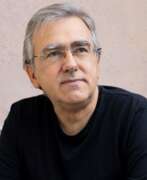

Luís Tinoco is a Portuguese composer and producer of new music programs on radio.
Tinoco studied at the Escuela Superior de Musica de Lisboa, then at the Royal Academy of Music in London and at the University of York, where he received his doctorate in composition. Since 2000 he has been working as a freelance composer. He is also the author and producer of new music radio programs for Antena 2/RTP and lectures at the Escuela Superior de Música de Lisboa (EMSL).
Luis Tinoco's major works include the operas Evil Machines and Color Me, as well as the cantata The Wanderings of a Lonely Dreamer.


